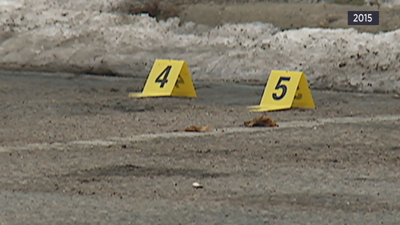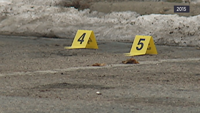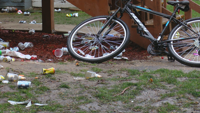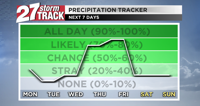Nearly ten years after Trevon Townsend was shot in the parking lot of the Dutch Mill Park & Ride, the suspect has been charged with 1st degree reckless homicide. Court records show Townsend was left paralyzed and remained in the hospital for roughly two months after the shooting. Kamonzi Turner was first charged with 2nd degree reckless injury in the 2015 shooting and pleaded guilty. Turner was sentenced to 8 years in prison in 2016. According to the criminal complaint, Townsend suffered a medical emergency in 2021 and was pronounced brain dead.
MADISON (WKOW) -- Questions remain surrounding future proceedings in a 2015 shooting turned homicide.
Nearly 10 years after Trevon Townsend was shot in the parking lot of the Dutch Mill Park & Ride, the suspect has been charged with first-degree reckless homicide.
Court records show Townsend was left paralyzed and remained in the hospital for roughly two months after the shooting.
Kamonzi Turner was first charged with second-degree reckless injury in the 2015 shooting and pleaded guilty. Turner was sentenced to 8 years in prison in 2016.
According to the criminal complaint, Townsend suffered a medical emergency in 2021 and was pronounced brain dead.
The complaint states an autopsy was performed and showed Townsend died of "complications of a remote gunshot wound of the torso and neck, with ensuing cervical spinal cord injury."
After the final results of the death investigation, Townsend's death was ruled a homicide in 2022.
Turner was then formally charged in Townsend's death on April 1, 2024.
Since he was already convicted in the shooting, 27 News wanted to know if the case might fall under the Double Jeopardy Clause.
The double jeopardy clause of the Fifth Amendment prohibits anyone from being prosecuted twice for substantially the same crime.
The Wisconsin constitution states, "No person may be held to answer for a criminal offense without due process of law, and no person for the same offense may be put twice in jeopardy of punishment, nor may be compelled in any criminal case to be a witness against himself or herself."
Double Jeopardy would ultimately stop Turner from being tried in the case if the new allegations were the same or similar to the previous charges of which he was convicted.
27 News sat down with UW Law professor John Gross to go over what qualifies as double jeopardy.
Gross teaches criminal law and defense law, and is a former defense attorney.
"If there's an additional element to the offense, then it makes it a different crime," Gross explained.
He said Turner's case wouldn't qualify since the new element is that the victim has since died.
"The prosecution can now try the person who committed that offense that led to the death again, because this time, they're gonna have to prove not just that he caused reckless injury, but he caused reckless injury that resulted in death," he added.
Instead, he said the case boils down to causation.
"You have to have been found to have caused the injury or caused the death and causation is defined as a substantial factor in bringing about the result," Gross explained.
He said prosecutors will have to prove, beyond a reasonable doubt, that Turner caused Townsend's death, despite it being several years after the shooting.
"Their challenge is actually proving beyond a reasonable doubt that that injury was a substantial cause of the death because in the intervening years, other things could have contributed to the death," he said.
That's where Gross said things can get blurry.
"To be the basis of criminal liability, it has to be a substantial factor," he added. "And so while there can be lots of causes over time that bring about a result, you're only subject to criminal penalty if your actions were a substantial cause in bringing about the harm or the death of someone else."
Meaning, prosecutors will have to prove through medical records and the autopsy that the 2015 shooting played a substantial role in Townsend's 2021 death.
Gross said one issue in the case could be the length of time between when Townsend died and when charges were filed.
"Now, the defense could say if they had brought the charges sooner, we might have been in a better position to challenge the results of the autopsy," Gross explained. "We might have said we would like to do an independent autopsy and challenge some of the findings or results, but they don't have that opportunity anymore because the person has passed away so long ago."
If prosecutors don't have an excuse for the delay in prosecution, he said the case could be jeopardized.
"If the delay by the prosecution wasn't excusable in some way, and it did lead to the destruction of evidence, or the inability of the defense to actually challenge some of these findings that could be prejudicial to the defense," Gross added. "And they could be arguing that the charge should be dismissed, based on speedy trial grounds."
Ultimately, Gross said this type of case is rare and raises the serious issue of causation.
"The cause of death is really, really important and if the defense isn't in a position to actually do an independent evaluation, and have their own expert contest the idea that this was in fact the cause of death, that could be problematic," he said. "That could definitely, potentially raise issues regarding whether or not the charge should go forward."
If the prosecution succeeds in proving Turner caused Townsend's death, Turner could face up to 60 years in prison.
Turner is expected to make his initial appearance on May 6, 2024.














